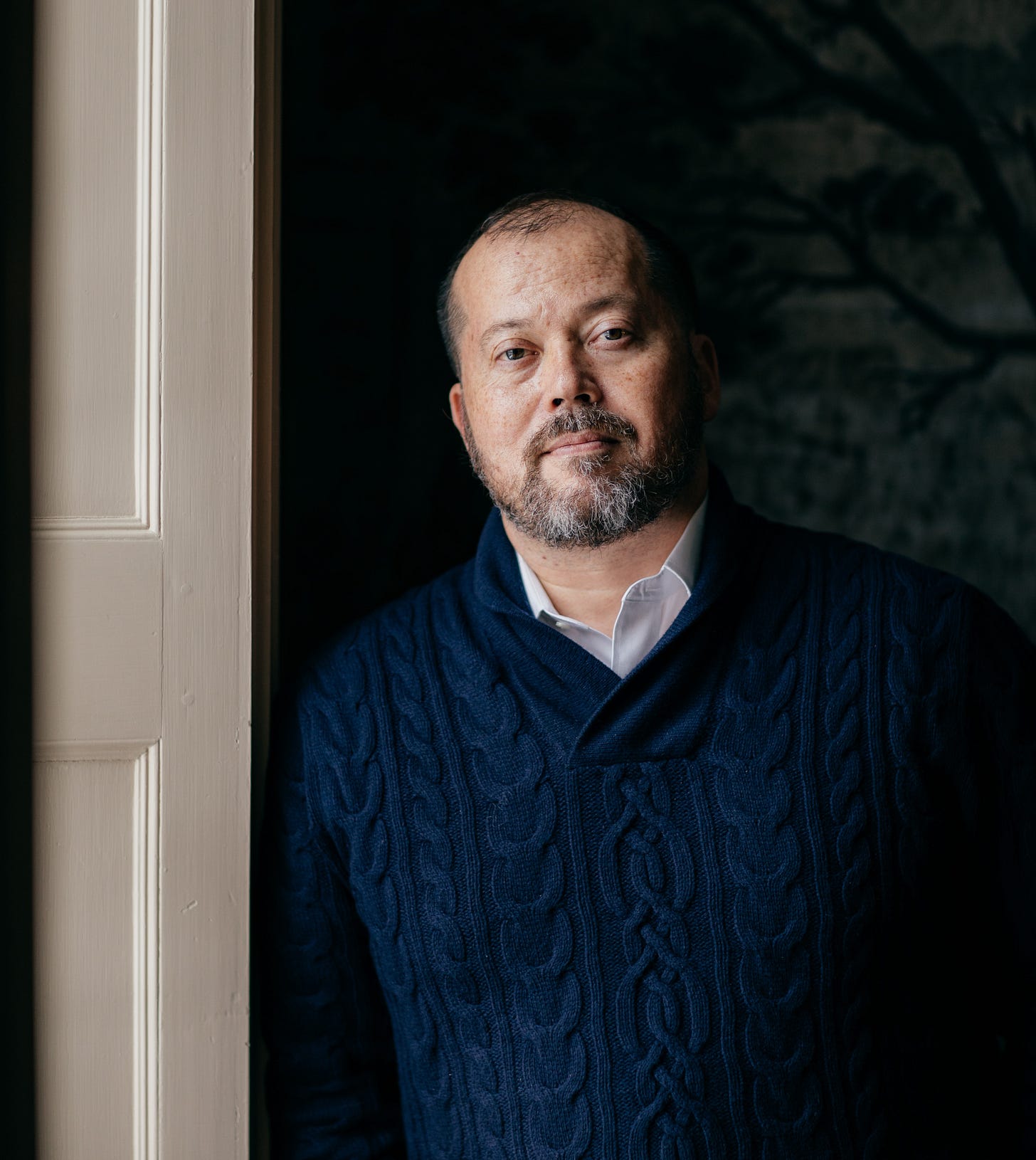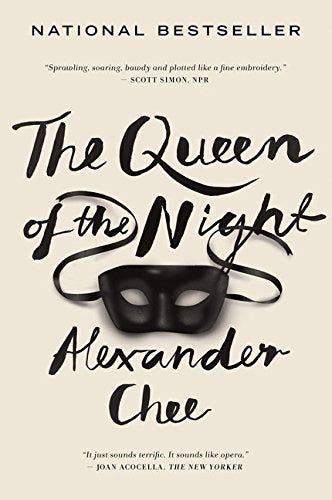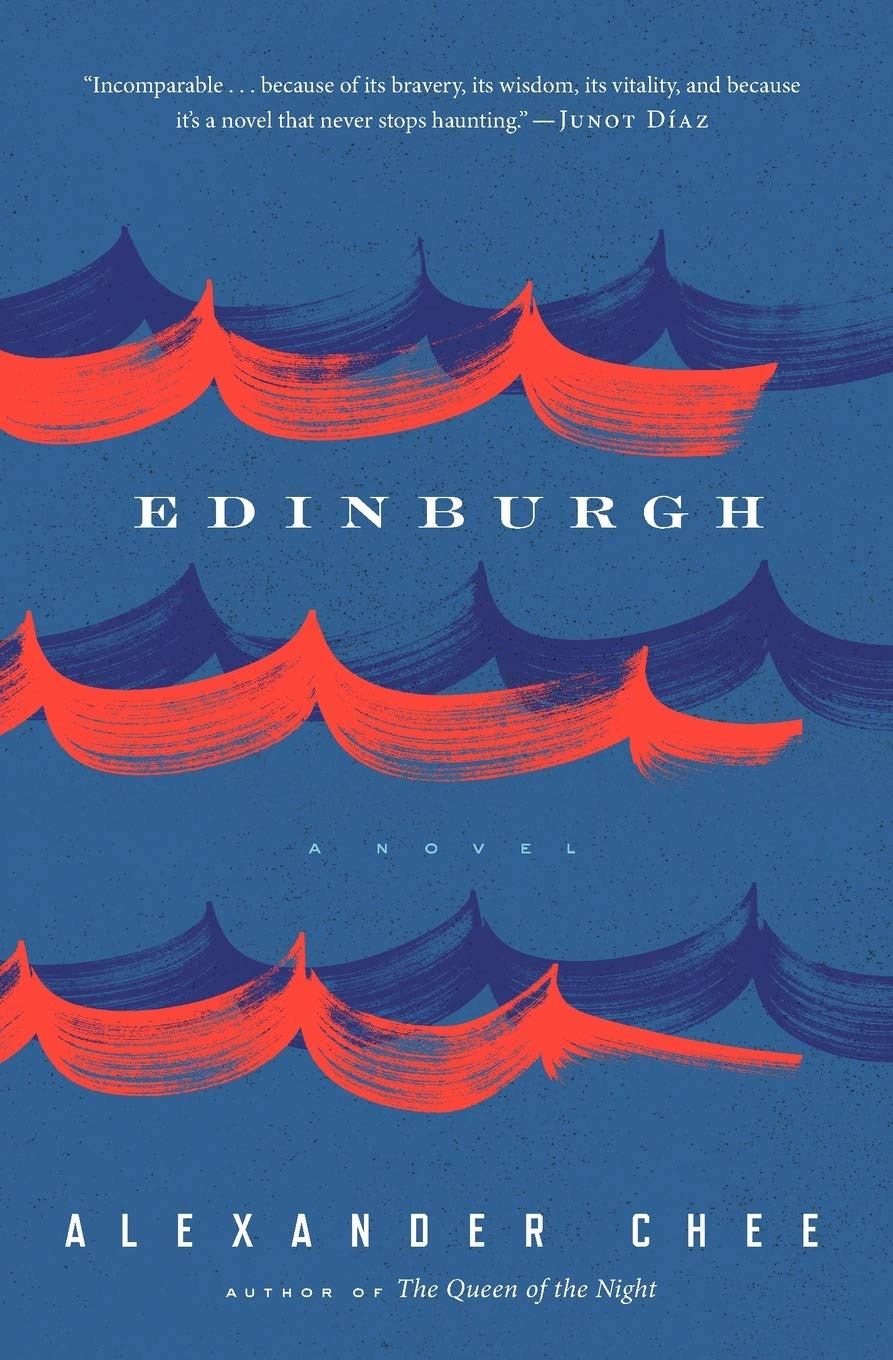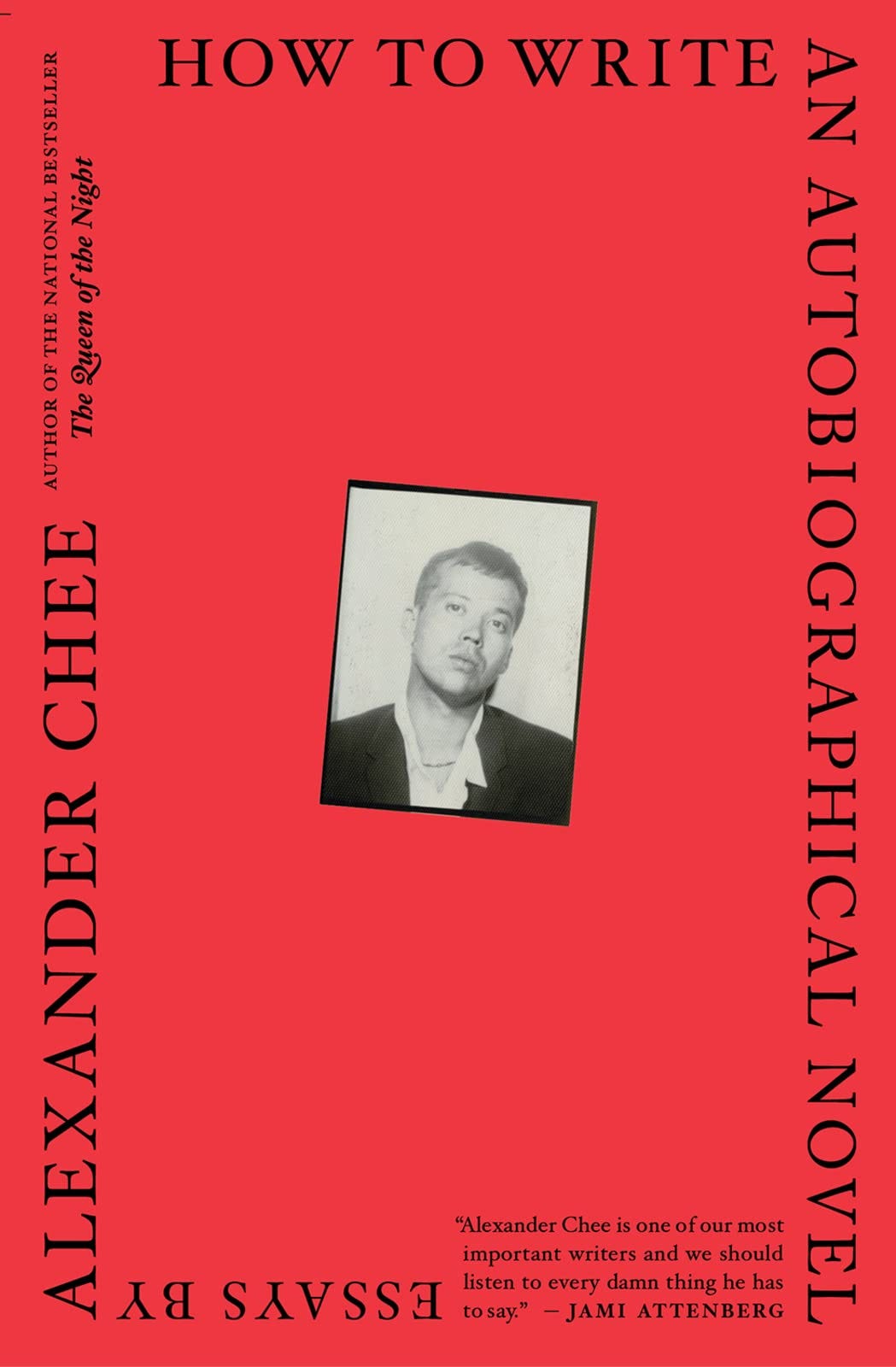Alexander Chee on How to Write a Novel
The author discusses writing by hand, keeping a side journal, and “the monogamy of the idea”
A few years ago, in 2017, I met up with the great Alexander Chee at the writer’s hangout Café Loup to ask him about, well, writing books. His advice was characteristically thoughtful, generous, and inspiring. I think about it all the time. But in the years since, the online magazine that published the interview has disappeared as has, sadly, Café Loup. However, since the conversation was about writing processes and craft it seems like a perfect fit to republish here.
Alexander Chee is the author of two critically acclaimed (and beautifully written) novels, Edinburgh and The Queen of the Night, as well as the essay collection How to Write an Autobiographical Novel. Chee was a 2021 United States Artists Fellow and a 2021 Guggenheim Fellow in nonfiction, and has also won a Whiting Award, NEA Fellowship in prose, among other honors. Chee is also an all-around literary mensch, working as an editor, professor, and critic, as well as simply one of the best writers to go to for advice. Check out his Twitter, website, and books here.
Lincoln Michel: Maybe a good place to start is how you start your novels. I believe you’ve told me that you write your first drafts by hand.
Alexander Chee: I think I told you I was experimenting with it again. I did it a long time ago. One of the big influences for me early on was Janet Frame, who published a massive three-volume autobiography that Jane Campion turned into the most beautiful and I think important biopic ever — maybe the only good biopic — called Angel at My Table. I was so in love with the biopic that I bought the autobiography. In it, Frame outlines her process. She would hand-write a draft of a novel entirely. Then typing it up was one revision. Then she would type it up again, and that was another revision. I decided to try it and actually really enjoyed it. So, for example, Edinburgh is drafted on many legal pads.
Do you still use her process?
As The Queen of the Night went on, it became a kind of Black Swan fugue state of writing a novel that was so demented. I think my old computer has over 600 files marked Queen something or other.
Are those each different drafts?
Sometimes they are different by like a chapter. I have a much-abused memory. It just isn’t up to the task of remembering all these things. I was so sure for a while that I’d remember the different drafts. So what I ended up doing was a workaround. I created a process that a lot of my friends have adopted, where I created a journal that was specifically for the novel that I was working on. So each day I would open it when I started working and I’d read the most recent entry so I could remember where I was. And, if I needed to, I could refer to things in the past. And as the day went on, if I needed to dip into old files, I’d list them. It was a way of leaving a trail for myself about my own thoughts. I’d include any questions I had about the manuscript. I’d vent about scenes that I thought were still disgusting or pathetic or unworthy etc. I’d ask questions about why that was the case. Then the next day I’d try to answer them. Because a lot of the way I’d work was coming up with questions and then trying to answer them. If you are 17 years old and in Paris and you want to be an Opera singer, where would you try to get yourself educated? How would you get there? If you didn’t know the language, how could you have someone else intervene? What lies would you tell? What truths would you know? All these kind of questions became the way I went forward with that book. And the journal was a way to keep track of it. I also kept what I call a “chop file,” which proved to be very important. I do it now with all my pieces. If I cut a big section of text, I put it in this file. So I don’t just delete it. With The Queen of the Night it became a situation where the chop file was the length of a novel and the thing I was calling a novel was 75 pages long. So I was like, dude, what are you doing? It turned out I was so afraid of what the novel was that I kept cutting it and throwing it into this bin. It turned out to be a pretty decent mirror for compartmentalizing your life: you think you are only living the one life you are living but you have this massive trove of unexplored memories off in another section of your existence. I looked over it and I was like, oh, it’s all the novel. I just have to figure out the links, and that’s what I did.
I like the journal idea. I might use that.
There’s a whole rationale to it. The way that you work with it is you write an entry when you finish working at the end of the day. You complain to it and ask yourself questions, list any files you looked up or sources that you used. I kept it like a blog, so the most recent entry was always at the top, and the first entry was always at the end. I was looking at the way I was thinking the night before or the day before, and I could drop back into the mind of where I was at. So I wasn’t staring blankly at the page with a kind of hopeless anxiety, but instead I was engaging with the questions that I had left off with. At the time, it was partly a way of fighting against the way Microsoft Word works, where you were always where you began, at the beginning, instead of where you left off. In the old days of the typewriter, when you got back to work on something, the page was still in the typewriter. You were right where you finished. That’s the place to pick back up again.
What does writing by hand provide you, beyond avoiding the distractions of a computer? Do you feel like you write differently on paper than on a laptop?
I saw a study about this a long time ago, and there have been several more over the years about the benefits of handwriting. The first is: you use more of your brain. You calm down. You enter a space that is much like when you speak extemporaneously and the knowledge in your brain transforms as you talk. Most of us who’ve taught have had this experience — answering a question, pursuing a topic in discussion, you find yourself learning about what you already know in some new way as you say it. And so that seems really valuable for drafting. I find myself leaning into the curve of a long thought, almost like when I ski and I’m on a slalom turn — I can feel the way the turn and I, the hill, the gravity, the snow, all are collaborating on my movements. And for moving a little more slowly than I can when I type, a compression builds. Also, typing something on a computer makes it look book-like right away. That’s not always to our best advantage as writers. Drafting by hand, I give myself the permission to be messy. And in a first draft, I need that.
You pulled The Queen of the Night from publication in 2013, to add in new details that you’d found in your research, right?
Right. This is something you basically get to do once in your career as a writer, as I understand it. I think it worked. I think it was right as a gesture.
How close was it to publication?
We were in copyedits. The reason I discovered what I did is that there’s a fact check that’s part of the copyedit of a historical novel.
Was it a big battle?
It wasn’t a battle exactly. One thing that every writer should know early on in their career is that you should never surprise your agent. Any conversation you’re going to have with your editor that’s serious, you should rehearse it with your agent first. And the agent will tell you whether or not you need to have the conversation, especially if it’s disruptive to the editorial process, and then they’ll tell you how they might or might not be able to help you. I made my case to my agent first once I knew what I wanted to do. She made the case to my editor. When you do that, you have to pitch them how it will benefit the book. Because at that point, once you’ve sold a book to a publisher, it’s a very serious game that involves the livelihoods of everyone involved. The editor, everyone in production — everyone is affected. You have to show that you respect that — that it’s more than artistic nerves or anxiety or whatever. And I do try very hard to acknowledge the way in which publishing is a team effort. Because these people are taking care of my work, and in my way I’m trying to take care of theirs.
I feel like that’s something that young writers aren’t aware of. You’re taught to think writing is just a solo activity, then you sell your work and let someone else handle it… which is just not how it works.
It’s not how it works.
When you’re doing revisions, do you give yourself a different task for each draft? Like go through and edit for voice, then edit for plot, etc. Or do you do it all at the same time?
With Edinburgh, I did it in versions. This was about story. This was about images. This was about voice. I did it with Queen also. What I realized with Queen is that there’s a unity that you have to attend to. There’s a revision that I call a “set-decorating revision.” Are the things that need to be where they need to be where they need to be? Did I get them there? With set decorating, if there’s a gun that’s supposed to be pulled out a drawer, the set decorator has to put it in there. The novelist does also. But usually a revision provokes revelations about the other processes. With the essay collection I’m finishing now, I realized there’s a blind spot in terms of description. Because things are so familiar to you, you forget to describe them in the way you would in a novel. You really have to force yourself to create those descriptions.
The Queen of the Night is written in a style that fits the subject matter, an operatic style and tone. Do you have a specific practice that helps you get into the voice of a piece you’re working on?
Yes, if there’s a piece of text that reminds me of the tone that I want, I read that. If there’s something that I’ve written that’s the ultimate tone, I read that first then I go into it so that it’s in my ear. In The Queen of the Night, there was an epilogue to the manuscript, a paragraph from the Goncourt brothers’ diaries, and it was there basically for me to read every time I opened the manuscript to set the tone. Knowing. Gossipy. Elegiac.
You started the Dear Reader series at the Ace Hotel, for one night sleepover residencies. And also started to help the Amtrak train ride residencies. I kind of think of you as the founder of “micro-residencies.” Is that something you do yourself? Give yourself a hotel room for a couple nights or just go somewhere else for a weekend?
It is. For me, I love to write somewhere where no one knows that I’m there. When I was a little boy, I used to vanish on my mother. I loved what felt to me to be the power of no one knowing where I was. Which of course was terrifying for her. But I do think in fiction we’re trying to make a home for these fugitive selves. People that we might be when we’re not around others. Or at least people who we can be in communication with when we aren’t being the people we say we are in the rest of our lives. So the ways that I encounter that are being in these anonymizing spaces. Part of the reason that it’s trains and not planes is there aren’t really places to work on a plane anymore. Someone puts their seat back and suddenly your laptop is on your chest.
The last time I was on a plane I was sitting next to someone watching boxing videos on their phone with the volume on.
Yeah I don’t let people do that. I think it’s really important to tell people they have to turn that off or use headphones. I’m not sure why people think they can do that.
You write a lot of different things, from novels to essays. Do you have to work on one project at a time or do you flip back and forth?
I can flip back and forth, but novels don’t really like that at a certain point. It’s like some kind of monogamy of the idea sets in. Like you and the novel are dating.
That’s a great phrase, the monogamy of the idea. It’s hard to be in an open relationship with a novel. You have to keep the tone, and plot, and characters, and so many other things in your head.
At a certain point it’s unbearable to read anything other than what you are working on. At another point, it’s unbearable to read the thing you are working on without reading anything else.
You’re obviously very active on social media. Is that something you have to turn off when you are writing?
I actually do use it to talk to friends. It’s like my primary purpose. It reminds me of the bars I used to go to in Brooklyn where I knew that I’d run into somebody. So I could write until I was done writing and I could go out and I’d know that I’d find someone. That’s not really how Hell’s Kitchen works. It’s not really how Vermont works up at Dartmouth. But it’s how social media works. For me, it’s a moment of human connection, then I go back to work. The things we have to watch out for are that kind of approval seeking that sneaks up on you. Every writer should be wary of the ways they seek approval from an audience. One thing I’m worried about with social media and writers is that you get used to the idea that people know who you are when you post something, and you stop introducing yourself. And when you sit down to write, you have to introduce who’s talking.
Do you see that as something that’s infecting the way people write when publishing pieces?
Yes, including myself. I’m very wary of it in myself.
There’ve been a lot of essays and counter-essays about the state of the essay recently, and problems with the online personal essay. Part of the issue might stem from an idea that essays today are too narrow, that you aren’t introducing yourself to new readers but just providing what people who already follow you expect.
That’s possible. That’s what separates a blog post from an essay or a short story. There’s that Vivian Gornick book, The Situation and the Story. In it, she talks about how the key to a powerful essay is knowing who you are in relation to the story you are telling, and establishing that for the reader. And I think in social media you get the idea “they all know it’s me, I won’t even tell them who I am” and that’s where you fly off the rails. Where you write something that doesn’t do enough work. It’s all about the mixed context, the private self versus the public self. The private self is the character telling the essay, if it’s a personal essay, the public self mediates. They are both at work. In fiction, it is more obvious that you have to describe who is talking. Even then, I feel like I read too many novels that act as if I’ve read the jacket copy. I don’t like to read jacket copies. I like to just read the book and see where it takes me. That’s my big test to whether it’s a good book or not. One of the most powerful questions I ever got from a student was when I was a grad student at Iowa and one of my best students said “how do you know what to read?” I was so thrown. I thought, how do you not know? How does anyone not know? Then I thought, how do I know? How do I choose? How do I explain how I choose? Can I defend what I choose? It was this cascade of realizations. I was like Chee, you have to give this girl an answer. She’s 18 years old and she looks up to you. She respects you and she wants to know what your answer is. It was my first time teaching. So I proceeded in a literal way, which is one of my favorite ways to answer questions. I said, well I open it up, I go to the first page, and if I feel like it speaks to me then I keep reading it and if I feel like it doesn’t, then I don’t. And that’s still the test I think that you have to put everything to.
As always, If you like this newsletter, please consider subscribing or checking out my recently released science fiction novel The Body Scout, which The New York Times called “Timeless and original…a wild ride, sad and funny, surreal and intelligent” and Boing Boing declared “a modern cyberpunk masterpiece.”







I hadn't read this one before! Such great questions for Alexander, and I love the way he excavates the emotional minutiae of the writing process. Thanks!
Good one!